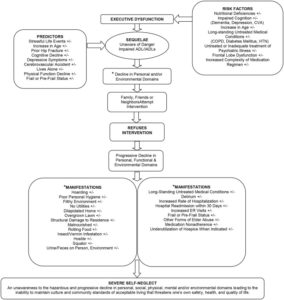How to Identify and Intervene in Geriatric Self-Neglect
With Lauren Southerland
Self-neglect is the primary type of abuse reported to APS and it is also one of the most complicated geriatric syndromes to manage. It is both a diagnostic challenge, as an older adult will rarely tell you that they can’t take care of themselves anymore, and a care coordination challenge, because it is exacerbated or triggered by medical conditions, cognitive impairment, mental health issues, substance abuse, and poor social support.
In this episode GEMCast host, Dr. Shenvi sits down with Dr. Southerland for a conversation about self-neglect in older adults. Learn about common symptoms, risk factors, and manifestations of self-neglect as well as quick cognitive assessments that can be used to determine if patients have the capacity to care for themselves.
Resources
This article from 2021 derived a conceptual model of why self-neglect occurs in older adults:

References
Pickens S, Daniel M, Jones EC, Jefferson F. Development of a Conceptual Framework for Severe Self-Neglect (SN) by Modifying the CREST Model for Self-Neglect. Front Med (Lausanne). 2021;8:654627. Published 2021 May 17. doi:10.3389/fmed.2021.654627 https://www.ncbi.nlm.nih.gov/pmc/articles/PMC8165169/
Example of a quick cognitive assessment as outlined by Dr. Southerland:
Orientation:
- Ask for their full name, birthday, and the current date
- Ask the patient to introduce anyone else in the room
Recall:
- Choose 3 easy, common words for the patient to remember and recall within 5 minutes
Focus:
- Numerical option: serial sevens (counting down from 100 by sevens)
- Spelling option: spell ‘WORLD’ backward
Other functional question examples:
- “What would you do if you smelled smoke in the house?”
- “What’s the most difficult thing around the house for you?”